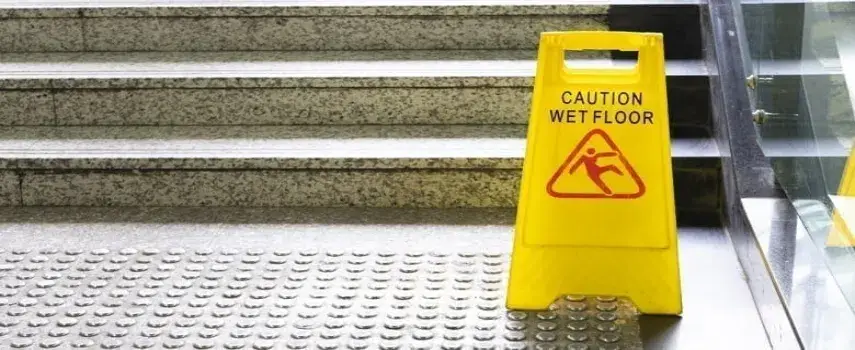Any slip and fall accident can raise some tricky legal issues. It is important to know what you have to prove, and how you are going to prove it. This article exams a slip and fall in an office building. We will focus on how the court handled the specific issue of notice. Essentially, did the defendant have a fair chance to clean or prevent the spill.
The Case
A woman was walking in the morning to work when she was caused to track some water into her office. Just prior, the defendants sprayed water on the sidewalk adjacent to their office building to clean it. Water was tracked from her and other employees of the building on the marble lobby floor. The woman slipped on the tracked in water. The woman sued the owner of the building the owner’s managing agent. She also sued the outside contractor providing cleaning services to the building. Defendants argued that they were entitled to dismissal of the complaint in this slip and fall accident. Therefore, they filed a motion for summary judgment dismissing the complaint.
In essence they were arguing that there was no dispute as to the material facts of the case. Under this scenario they felt they were entitled to dismissal as a matter of law. The trial court denied the motion, and defendants appealed the slip and fall accident ruling. The case went to the First Department to decide if there were any disputable factual issues.
The Appeal

The contractor’s worker, who actually hosed down the sidewalk that morning testified. He said they placed mats at the building when it was raining outside.
He also confirmed that no mats were in place on the lobby floor that morning.
The building property manager testified that contractor’s normal procedure was to place runners in the lobby when the sidewalk outside was being cleaned. Plaintiff also testified she did not see any mats in the lobby when she had her slip and fall accident. The First Department held that tracked-in water that creates a slippery floor can be a dangerous condition which causes slip and fall accidents.
Defendants created this condition in the course of cleaning a premises can give rise to liability. Therefore, the First Department held that since there were genuine issues of fact about whether defendants created a dangerous condition, the motion court properly denied summary judgment.
First, there was a disputable issue of fact whether contractor, whose employee was responsible for cleaning the sidewalk that morning, launched a force of harm causing plaintiff’s injuries. Secondly, the First Department indicated that there was an issue for the jury concerning whether the defendants exercised reasonable care, including whether they took reasonable precautions against foreseeable risks of an accident while cleaning the sidewalk during a busy work morning.
The Result
Beyond that, the First Department cited few significant rules applying to the subject case. Initially, the First Department indicated that “reasonable care does not require an owner to completely cover a lobby floor with mats to prevent injury from tracked-in water, it may require the placement of at least some mats.” Secondly, pointed out that “open and obvious condition relieves the owner of a duty to warn about the danger, but not of the duty to maintain the premises in a reasonably safe condition.” Finally, the First Department stated that “while an outside contractor generally does not owe a non-contracting party a duty of care, an exception applies when a contractor fails to exercise reasonable care in the performance of its duties, thereby launching a force or instrument of harm that causes injuries.”
The First Department unanimously affirmed lower court’s decision denying defendants’ motion for summary judgment. The sent the slip and fall accident case back down to the lower court




